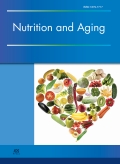Authors: Burton-Freeman, Britt | Edirisinghe, Indika | Cappozzo, Jack | Banaszewski, Katarzyna | Giordano, Rose | Kappagoda, C. Tissa | Cao, Yumei | Kris-Etherton, Penny
Article Type:
Research Article
Abstract:
BACKGROUND: Lipids, inflammation, oxidative stress and elevated blood pressure are targets for lowering cardiovascular disease (CVD) risk with a healthy diet. OBJECTIVE: We tested the effect of tomato products, dietary sources of lycopene and potassium, on changes in lipids/lipoproteins, inflammation and blood pressure. METHODS: In a two-center, randomized, parallel, controlled trial, processed tomato or non-tomato products matched in energy, sodium, and sugar content (HT = high tomato, 5 servings/day vs LT = low tomato/control, <1 serving/day, respectively) were included in the diets of free-living overweight men and women 21 to 70 years of age (n = 53) for 6 weeks. All
…subjects had a 3-week LT run-in followed by either 6-week HT or LT/control diet. A random subset of 23 subjects had 2 postprandial (6 hour) visits at weeks 0 and 6 to assess the enduring effects of the HT vs LT diets on high fat meal-induced changes in lipids, insulin, glucose, inflammation, and blood pressure. RESULTS: Fasting lipids/lipoproteins, insulin, glucose and C-reactive protein did not differ between the HT vs LT diets after 6 weeks intervention. Diastolic blood pressure was significantly decreased on the HT diet after 6 weeks compared to baseline, week 0 (p = 0.02) and compared to LT at week 6 (p = 0.03). Systolic blood pressure was not different between treatments at 6 weeks (p = 0.11). Tomato-associated effect sizes on blood pressure were greater in a sub-set of subjects with elevated blood pressure but were not statistically powered to reveal a significant effect between LT and HT treatments; however, the effect on lowering diastolic blood pressure remained, p < 0.05 compared to baseline). Chronic intervention with processed tomatoes did not impact postprandial glucose, insulin, lipids or inflammatory marker responses to a high fat meal challenge at the end of the study (n = 23). CONCLUSIONS: Processed tomatoes decreased diastolic blood pressure, but had no significant effects on other endpoints. Future research is required to confirm and potentially extend these findings in individuals with elevated blood pressure.
Show more
Keywords: Tomatoes, lycopene, cardiovascular disease, inflammation, lipids, blood pressure
DOI: 10.3233/NUA-150059
Citation: Nutrition and Aging,
vol. 3, no. 2-4, pp. 193-201, 2015





